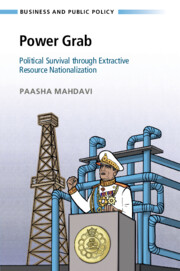Book contents
- Frontmatter
- Dedication
- Contents
- Contents
- List of Tables
- Acknowledgements
- 1 The Puzzle of Extractive Resource Nationalization
- 2 The Theory of Political Survival through Nationalization
- 3 Defining and Measuring Operational Nationalization
- 4 Why Nationalize? Evidence from National Oil Companies around the World
- 5 NOCs, Oil Revenues, and Leadership Survival
- 6 The Dynamics of Nationalization in Pahlavi Iran
- 7 Conclusion: The Implications of Nationalization
- Bibliography
- Index
6 - The Dynamics of Nationalization in Pahlavi Iran
Published online by Cambridge University Press: 31 March 2020
- Frontmatter
- Dedication
- Contents
- Contents
- List of Tables
- Acknowledgements
- 1 The Puzzle of Extractive Resource Nationalization
- 2 The Theory of Political Survival through Nationalization
- 3 Defining and Measuring Operational Nationalization
- 4 Why Nationalize? Evidence from National Oil Companies around the World
- 5 NOCs, Oil Revenues, and Leadership Survival
- 6 The Dynamics of Nationalization in Pahlavi Iran
- 7 Conclusion: The Implications of Nationalization
- Bibliography
- Index
Summary
How does nationalization of operations causally increase government revenue? Using the case of oil politics in prerevolutionary Iran, this chapter analyzes production elasticity and reduced informational asymmetries after the Shah of Iran nationalized the oil operations of BP and its partners. The chapter draws on a combination of conversations documented in archival records and quantitative analysis of historical fiscal data from the BP Archive. It begins by explaining the Shah’s surprise decision in January 1973 to reconfigure the National Iranian Oil Company from its role as a passive observer to a fully operational oil company able to set production levels and prices. The chapter then presents findings using BP’s revenue projections as counterfactuals to estimate the causal effects of the Shah’s decision with respect to whether NOC reform increased government take of oil revenues in 1974–1975 and whether revenues collapsed after retaliation by international oil companies in 1976 to strip the NOC of its ability to sell oil on the global market. The chapter illustrates both the nuances and consequences of operational versus nonoperational NOCs for fiscal strength.
Keywords
- Type
- Chapter
- Information
- Power GrabPolitical Survival through Extractive Resource Nationalization, pp. 177 - 211Publisher: Cambridge University PressPrint publication year: 2020

